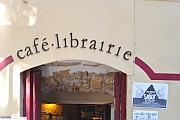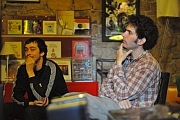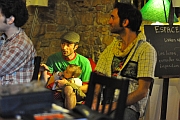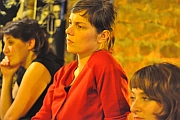lyon/tasse-livre 22.06.2010
description of/satisfaction with:
lyon is a medium-sized town. there is a difference between native and non-native lyonnais in the scene. native lyonnais feel more connected to the scene.
the independent scene in lyon is not a recent development. already in the 60’s and 70’s there were active people in a scene that laid the groundwork for the scene today.
lyon has hosted the FOCU two or three times..
there is a healthy public and regular high attendance at shows.
in some seasons there are concerts every day.
the punk scene is one of the largest and most effective in france.
most people go to independent shows to meet friends. it is not political.
most people probably know about the politics of a place, but don’t care.
there isn’t much crossover of musical styles or inter-generational mixing.
there is an overwhelming amount of bands. there are too many promotional tools (internet, myspace), so there is a conflict in the diy scene.
the independent scene has really grown over the last ten or twenty years. there are two or three independent bookshops. young bands can now use computers to record.
there is some squatting, but it is usually short-lived. currently there are two squats, but they are more for artists – people from the rock scene don’t go to them.
the scene today is very creative, diverse and inspiring, but there is also a sense of frustration because many people leave the town for places where the scene may feel to be, or is, more concerned about DIY.
lyon is a high-transition town because of the universities and job market. it has a reputation for being a cold town, in which it is hard to make friends.
there are some internal scene problems: rifts, inter-generational conflicts, lack of mixing musical styles in the few places there are to play.
the scene can be too sarcastic and narrow-minded.
publicity:
most information is found on the internet.
postering is done legally and illegally.
a lot of information is distributed at shows; for example, information about an illegal postering trial. many people showed up to support the defendant.
scene development/maintenance:
all aspects of the scene have responsibility.
some promoters invite unknown bands to play with big headliners to help introduce audiences to new music.
some promoters consult each other about shows and bookings.
recently a lot of teens showed up for a teen band at a show a ground zero, but it isn’t sure if they even knew what kind of place ground zero was. it is important to expose audiences to the venues structure.
it is hard to start a new band. there is no help from the municipality. everything has to be diy.
funding from the municipality is not diy. this conflict makes some people frustrated and they leave the scene.
some feel the scene won’t last.
the world has changed. it makes it hard to hang on to active people in the scene.





hey there
about the political aspect. lately we had a discussion about how political our concerts are/should be. sometimes we have political bands, but not all the time.
the main question is: should every gig, be a political one respectively should we (the collective) do politics at every gig (by flyers, information about the house, the project, our aims, etc.)?
it’s very difficult. on one side, there is the opinion, that it is legitimate, to come and only “consume”; on the other hand, people say, we are a place, where politics happens – in daily life!
I, personally, think, that politics should always be present – and because it is not like this, in “normal” daily life, it should be even more present in the independet music / autonomic scene.
What do you think?
greez
michele